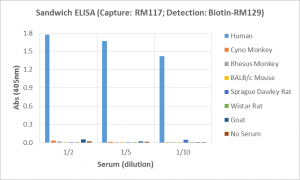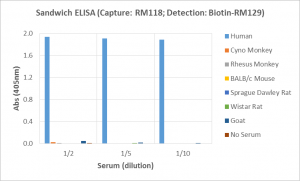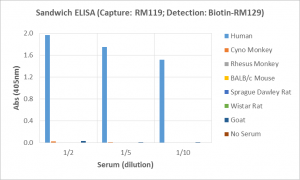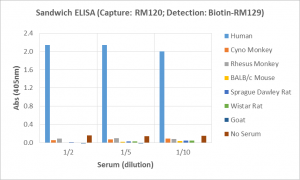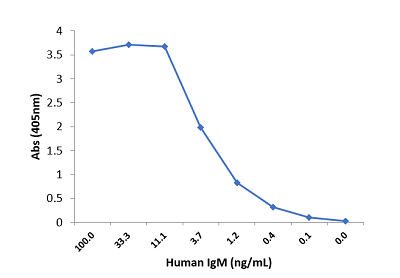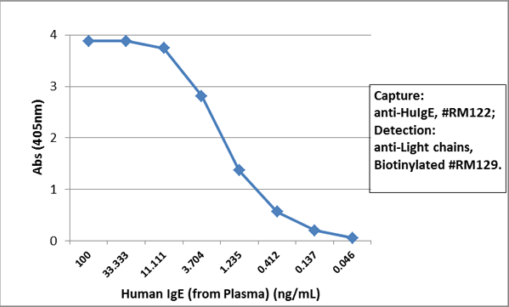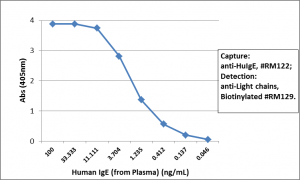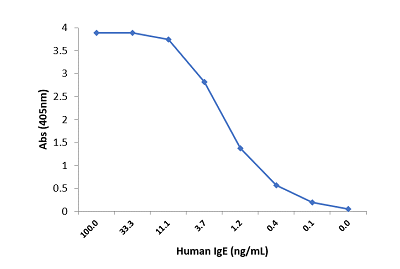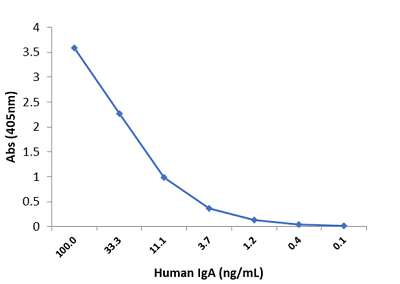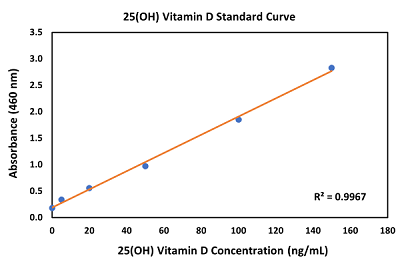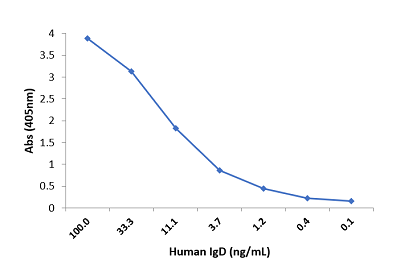
Sandwich ELISA using RM123 as the capture antibody (100ng/well), and Biotinylated anti-human light chains (k+l) antibody RM129 (0.2ug/mL) as the detection antibody, followed by an alkaline phosphatase conjugated streptavidin.
IgD (human) Matched Antibody Pair
REV-31-1025-MK
ApplicationsELISA
Product group Antibodies
ReactivityHuman
Overview
- SupplierRevMAb Biosciences
- Product NameIgD (human) Matched Antibody Pair
- Delivery Days Customer2
- ApplicationsELISA
- CertificationResearch Use Only
- Protein IDP01880
- Protein NameImmunoglobulin heavy constant delta
- Scientific DescriptionThe Human IgD Matched Antibody Pairs is specific to Human IgD and has been demonstrated through ELISA. It does not cross-react to IgG from Non-Human Primate species (Rhesus and Cynomologus macaques), or mouse, rat or goat immunoglobulin. The kit can be used for the detection of therapeutic antibodies from samples obtained from experimental animals to provide accurate pharmacokinetic (PK) data. Immunoglobulin D (IgD) is an antibody isotype that makes up about 1% of proteins in the plasma membranes of immature B-lymphocytes where it is usually co-expressed with IgM. IgD is also produced in a secreted form that is found in very small amounts in blood serum, representing 0.25% of immunoglobulins in serum. Secreted IgD is produced as a monomeric antibody with two heavy chains of the delta (delta) class, and two Ig light chains. In B cells, the function of IgD is to signal the B cells to be activated. By being activated, B cells are ready to take part in the defense of the body as part of the immune system. IgD was found to bind to basophils and mast cells and activate these cells to produce antimicrobial factors to participate in respiratory immune defense in humans. It also stimulates basophils to release B cell homeostatic factors. - The Human IgD Matched Antibody Pairs is specific to Human IgD and has been demonstrated through ELISA. It does not cross-react to IgG from Non-Human Primate species (Rhesus and Cynomologus macaques), or mouse, rat or goat immunoglobulin. The kit can be used for the detection of therapeutic antibodies from samples obtained from experimental animals to provide accurate pharmacokinetic (PK) data.Immunoglobulin D (IgD) is an antibody isotype that makes up about 1% of proteins in the plasma membranes of immature B-lymphocytes where it is usually co-expressed with IgM. IgD is also produced in a secreted form that is found in very small amounts in blood serum, representing 0.25% of immunoglobulins in serum. Secreted IgD is produced as a monomeric antibody with two heavy chains of the delta (delta) class, and two Ig light chains. In B cells, the function of IgD is to signal the B cells to be activated. By being activated, B cells are ready to take part in the defense of the body as part of the immune system. IgD was found to bind to basophils and mast cells and activate these cells to produce antimicrobial factors to participate in respiratory immune defense in humans. It also stimulates basophils to release B cell homeostatic factors.
- ReactivityHuman
- Storage Instruction-20°C,2°C to 8°C
- UNSPSC41116163

